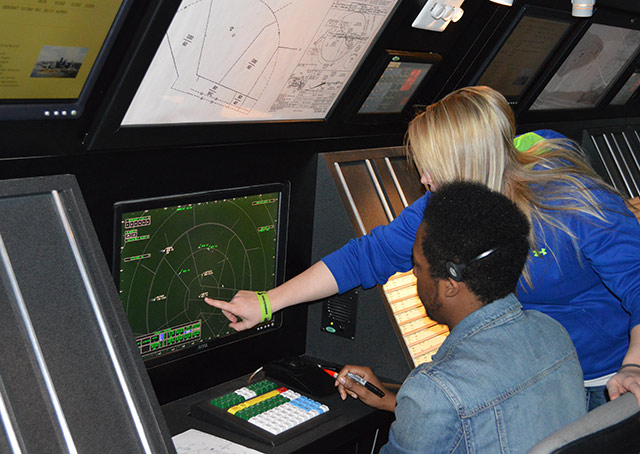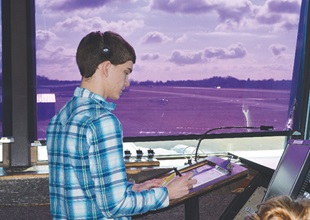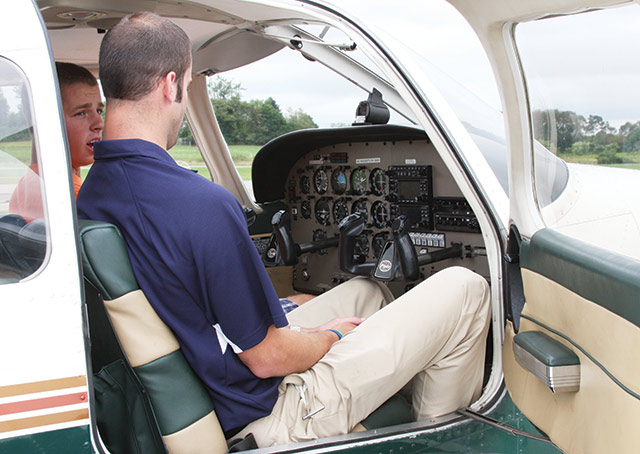
A community college in western Pennsylvania has launched a career-education partnership with area high schools, giving students an opportunity to explore aviation occupations and earn college credits—and, for some, private pilot certification—on graduation.
Twenty-seven students from nine high schools are enrolled for the initial, winter 2015 semester of the Aviation Academy at Community College of Beaver County, said Bill Pinter, CCBC’s director of aviation sciences and dean of the new program.
The students, sophomores through seniors, have opted to explore career paths as professional pilots, air traffic controllers, in airport management, or in the emerging field of unmanned aircraft systems.
Learning is hands-on at the academy facility at the Beaver County Airport in Beaver Falls, located north of Pittsburgh and beneath an overlying shelf of Class B airspace, where both the airport control tower and local aviation companies have employed CCBC graduates.
High-schoolers who embark on the Aviation Academy’s professional pilot career track can graduate with a private pilot certificate, and possibly an instrument rating, after taking flight training at two local flight schools. First-semester “discovery flights” are in the curriculum for all academy students in a Diamond DA20 single-engine airplane at ACES Aviation, and a Cessna 172 from Moore Aviation.

Students who enter the academy as sophomores can spend a full six semesters enrolled, graduating with 30 or more credits—more than half the requirement for an associate’s degree—in hand for college-level coursework.
“One course, double benefit,” Pinter said in a phone interview.
For Pinter, a retired Air Force colonel and F-15E Strike Eagle pilot who became dean of the CCBC aviation sciences program a year ago, the aviation academy’s launch is “just the beginning” for a program that has received a warm reception from regional schools, CCBC’s administration, and its board of trustees.
In 2014 Pinter attended the National Training Aircraft Symposium hosted by Embry-Riddle Aeronautical University in Daytona Beach, Florida. Studies presented there illuminated a “huge disparity” between the 20-year demand for professional pilots and the expected supply of eligible applicants, he said.
It struck Pinter that the industry-wide concern about workforce needs presented an opportunity for a community educational institution like CCBC, already known statewide for its collegiate-level professional pilot program and as one of about 36 such programs to include an air traffic control component. “Why not open our doors and provide the high school students with an opportunity to really explore these career paths?” he said.
With the support of CCBC President Christopher Reber and Provost Melissa Denardo, Pinter began developing the program. He composed a mission statement, listing objectives and goals that he defines broadly as “providing students opportunities to pursue an understanding of what is available in the aviation industry career paths.”
Forging partnerships with Beaver County high schools meant reaching out to 13 schools serving a total of 14 separate school districts. The 27 students enrolled in the initial academy semester that began on Jan. 20 represent districts in Aliquippa, Ambridge, Beaver, Blackhawk, Central Valley, Hopewell, Rochester, South Side, and Western Beaver.
Last summer Pinter had envisioned a fall 2015 program launch. But given the administration’s support and the upbeat response from school district superintendents who “saw the value of it right away,” the start date was moved up to January 2015, bringing on “daunting” logistical challenges associated with introducing a new program in the middle of an academic year.

There was another challenge. Beaver County “is a wonderful county, but not an affluent county,” Pinter says. Key support—in the form of $20,000 for needs-based scholarships—has come from the CCBC Foundation, whose board voted unanimously to support the academy. The funds have enabled several eligible students to enroll in the aviation academy, “and we plan to expand that in the fall.”
The Beaver County Airport Authority has also pitched in, funding purchases of the polo-shirt-and-khaki “uniforms” that enrollees wear.
CCBC President Chris Reber recently declared the program “off to a great beginning,” noting in a news release that the program “addresses high-priority workforce, economic development, and quality-of-life needs for our county and region.”
From regional carriers such as Republic Airlines to corporate flight departments and FAA facilities, aviation employers have often relied on Community College of Beaver County’s aviation program to help them meet their staffing needs.
Now, with demand for aviation professionals powerfully in focus at the industry level, students may discover that bright prospects await them, said Pinter, who regards the aviation academy’s students as a next wave of aviation pioneers.
“They are aviation pioneers for Beaver County because they are starting something brand new,” Pinter said.




